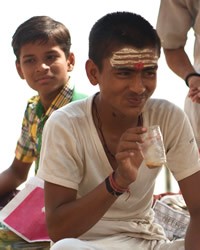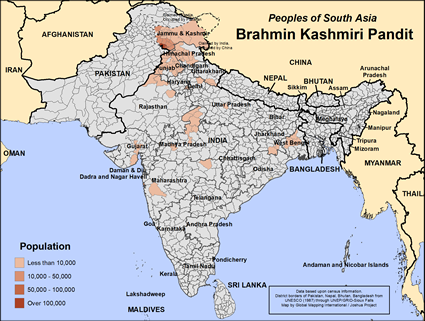Brahmin Kashmiri Pandit in India

Photo Source:
José Antonio Morcillo Valenciano - Flickr
Creative Commons
|

Map Source:
People Group data: Omid. Map geography: UNESCO / GMI. Map Design: Joshua Project.
|
| People Name: | Brahmin Kashmiri Pandit |
| Country: | India |
| 10/40 Window: | Yes |
| Population: | 713,000 |
| World Population: | 713,000 |
| Primary Language: | Kashmiri |
| Primary Religion: | Hinduism |
| Christian Adherents: | 0.01 % |
| Evangelicals: | 0.00 % |
| Scripture: | Complete Bible |
| Ministry Resources: | Yes |
| Jesus Film: | Yes |
| Audio Recordings: | Yes |
| People Cluster: | South Asia Forward Caste - Brahmin |
| Affinity Bloc: | South Asian Peoples |
| Progress Level: |
|
Introduction / History
The Brahmin Kashmiri Pandits of India claim to have lived in the north Indian mountainous region of Kashmir for over 5000 years. The word Pandit means a wise man or scholar of Hinduism. Pandit is often used as an honorific title.
Starting in 1989, thousands of Kashmiri Pandits were forced to leave their homes because of Muslim extremist who came to Jammu and Kashmir. The Pandits were told to convert to Islam, leave or be killed. Over 300 Kashmiri Pandit were murdered in 1990. As a result, almost all the Kashmiri Pandit fled to other parts of India.
Today many Pandits live in refugee camps. Others have settled in other parts of India. When the Indian government stated that the Kashmiri could safely return to their homes, the vast majority of them were afraid to return due to the presence of Muslim extremists who still operate in the Jammu and Kashmir.
The Kashmiri Pandits are educated people and still maintain their ancient occupations of Hindu priests, scholars and teachers. Others work as public servants and in law, engineering, computer science and medicine. The primary languages of the Pandits are Kashmiri and Dogri. As highly educated Indians, they also speak Hindi and English.
Jawaharlal Nehru, the first Prime Minister of India was a Brahmin Kashmiri Pandit.
Where Are they Located?
Many Brahmin Kashmiri Pandits have left their ancestral home for other parts of India. Many have settled in the Capital Territory of New Delhi and in the nearby state of Jammu. Unfortunately many are living in refugee camps hoping to find a permanent place to live.
What Are Their Lives Like?
The fleeing from Jammu and Kashmir by the Pandits has severely disrupted their lives. They have tried to continue their lives as best as they can. When they come to live in a new place, other Brahmins have come to their aid by helping their children get into colleges and helping them find employment.
As Brahmins, the Kashmiri Pandits lives are dominated by their religion of Hinduism. They will only marry other Brahmins and they prefer marriage within their own group. Families arrange marriages with the consent of the young people.
Some Pandits are strict vegetarians while others eat meat except for beef.
What Are Their Beliefs?
The Brahmin Kashmiri Pandits consider themselves to be devout Hindus. They are followers of the ancient religion of India, Hinduism. Kashmiri Pandits are chiefly followers of Shiva, the destroyer god. Their favorite goddess is Kheer Bhawani. The spring of Kheer Bhawani at the mouth of Sind Valley in Jammu and Kashmir is considered one of their most important and sacred places. Their branch of Shiva worship is known as Kashmir Shaivism. The primary tenet of Kashmir Shaivism is that the individual soul is one with the universal. Jammu and Kashmir has also been a land of Sun worship with shrines such as Martand Temple.
Sivaratri, the February holiday in honor of Shiva, is one of their main festivals.
What Are Their Needs?
The Kashmiri Pandits need to hear the life-changing gospel of Jesus Christ in a way they can understand. With so many now in refugee camps, they have physical needs that can be met by Christian agencies. Like all Brahmins they need to be humbled to see themselves as sinners and in need of God's remedy for sin, Jesus Christ.
Prayer Points
Pray that the Lord uses the disruptions caused by their leaving of their homes to make the Kashmiri Pandits open to the claims and message of Christ.
Pray that God moves Indian Christians to reach out and share the gospel with the Pandits.
Pray that God raises up Bible-believing churches among the Kashmiri Pandits.